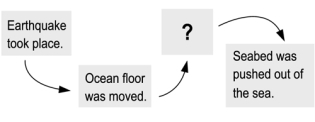
— Who usually does chores in your house?
—We are __________. I do chores on Monday, Wednesday, Friday and Sunday.
A. at work B. in turn
C. by accident D. for sure
 天天向上一本好卷系列答案
天天向上一本好卷系列答案 小学生10分钟应用题系列答案
小学生10分钟应用题系列答案科目:初中英语 来源:2014-2015学年黑龙江大庆林甸县九年级上期末检测英语试卷(解析版) 题型:单项填空
- The air pollution is terrible.
- It will be worse ________ we take action to protect the environment.
A. if B. unless C. until D. when
查看答案和解析>>
科目:初中英语 来源:2014-2015学年甘肃张掖第四中学九年级期末考试试卷(解析版) 题型:单项填空
— Why are you angry with Michael?
— Because I waited for him for two hours last night, but he didn’t _______ at last.
A.show up B. hand up
C. come up D. stay up
查看答案和解析>>
科目:初中英语 来源:2014-2015学年安徽省安庆市九年级下正月联考英语试卷(解析版) 题型:单项填空
— __________ have you been to Hong Kong on business?
— Once in a month.
A. How old B. How often
C. How soon D. How long
查看答案和解析>>
科目:初中英语 来源:2014-2015学年安徽省安庆市九年级下正月联考英语试卷(解析版) 题型:单项填空
— Are you at the airport? How’s everything?
— The flight __________ to Nanjing an hour ago. I have to wait for the next flight.
A. took off B. got off
C. broke off D. fell off
查看答案和解析>>
科目:初中英语 来源:2013-2014学年江苏句容天王中学九年级上期末学情分析英语试卷(解析版) 题型:书面表达
书面表达 (共1题,满分15分)
以下表格是对青少年问题的问卷调查,根据表格提供的信息,请选择其中的三条,并给出解决问题的建议,写一篇90个词左右的调查报告。开头已经给出。
What problems do the teenagers probably have?Here is a survey showing their main problems.
Problems | Causes | Advice |
Feeling stressed | Too much homework | |
Getting short-sighted(近视的) | Bad reading and writing habits | |
Fighting with each other | Don’t know how to get on well with classmates | |
Feeling tired of study | Computer games’ bad influence |
According to our survey, many teenagers have problems as grown-ups, but if they can solve the problem properly, they can develop better.
查看答案和解析>>
科目:初中英语 来源:2013-2014学年江苏句容天王中学九年级上期末学情分析英语试卷(解析版) 题型:阅读理解
The shock of the recent earthquake in Pakistan has brought another shock: the rise of a small island coming out from the water.
In the aftershock of the earthquake, people living in Gawadar, near the southwest coast, began to see a strange sight. They looked out into the Arabian Sea and saw a mountain-like shape coming out of the water. “I could see this gray, dome-shaped (穹顶形状的) body in the distance, like a giant whale,” Bahram Baloch, a local journalist, told the BBC. “Hundreds of people had gathered to watch it in disbelief (怀疑).”
So what happened? The earthquake measured 7.7 in magnitude (地震级数). The force was so strong that it moved the sea floor, releasing gas. This gas pushed the seabed, mostly rock and sand, upward and out of the water. This is how mud volcanoes (泥火山) are formed. The island that measures about 20 meters high, 30 meters long and 90 meters wide is actually the tip of the mud volcano.
Is it safe? Although people have visited this new island, scientists have found dangerous gas coming from the newly formed island. “Our team found bubbles rising from the surface of the island, which caught fire when a match was lit,” said Mohammad Danish, a scientist, to Universe Today.
These mud volcanoes are not rare. But it’s striking because this one has popped up(突然出现) in a populated (有人居住的) area, and not far out in the sea. However, it’s not expected to last very long. Most of these mud volcanoes are swept back under the sea within one year.
1.After the earthquake, what did people see in the sea?
A. A strange light. B. A blue whale.
C. A mysterious island. D. A mountain.
2.Which of the following can be filled in the box to show how mud volcanoes are formed?

A. Dangerous gas was released.
B. Rock and sand were mixed.
C. The storm blew up the sea.
D. Huge waves appeared.
3.What does the underlined(划线的)word “tip” mean in paragraph 3?
A. 建议 B. 顶端 C. 小费 D. 倾斜
查看答案和解析>>
科目:初中英语 来源:2013-2014学年江苏句容天王中学九年级上期末学情分析英语试卷(解析版) 题型:单项填空
I was doing my homework my parents were watching TV last night.
A. while B. as soon as C. because D. When
查看答案和解析>>
科目:初中英语 来源:2014-2015学年山东滕州大坞中学八年级上期末英语试卷(解析版) 题型:单项填空
He spends as much time as he can ___________ English every day.
A.to practise speaking B.to practise to speak
C.practise to speak D.practising speaking
查看答案和解析>>
湖北省互联网违法和不良信息举报平台 | 网上有害信息举报专区 | 电信诈骗举报专区 | 涉历史虚无主义有害信息举报专区 | 涉企侵权举报专区
违法和不良信息举报电话:027-86699610 举报邮箱:58377363@163.com